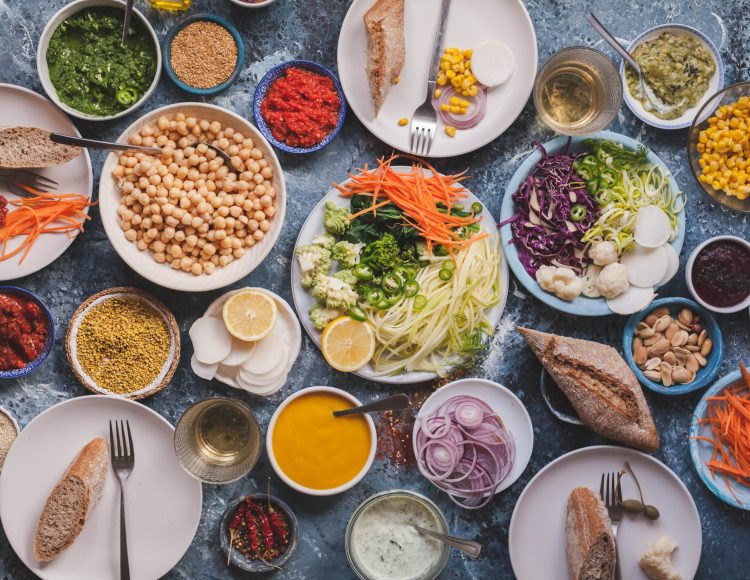A vegetarian diet can meet the nutritional needs of people of all ages. One of the biggest concerns people have about vegetarian nutrition is where vegetarians get nutrients that typically come from meat and fish, such as protein, iron, calcium, zinc, vitamin B12, and essential fats like omega 3. In most cases these nutrients are naturally included in a balanced vegetarian or vegan diet. It can however be useful to be aware of good nutritional sources. Here is a quick guide to how you can make sure you’re getting everything you need from your diet.
-
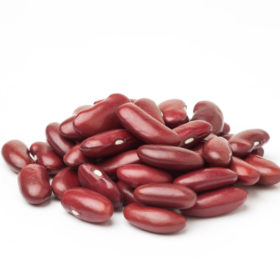
Protein
Protein helps to build and repair muscles
Everyday sources of protein:
Soya
Nuts
Beans
Cheese
Eggs
Cereals (e.g. wheat, rice)How much protein do I need?
Women: 45g per day Men: 55g per day
Hints and tips
According to research, it is easy for vegetarians to get enough protein from lots of different types of foods. You can find protein in places you might not expect, such as bread, potatoes and green leafy vegetables. Remember to vary your proteins to ensure a balanced intake in your diet. -
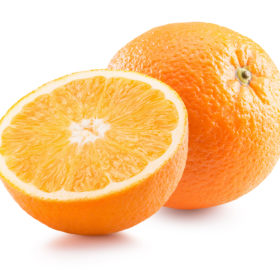
Calcium
Calcium is needed for healthy bones and teeth, and to make your heart work properly
Everyday sources of calcium:
Kale
Oranges
Grains and breads
Broccoli
Dairy and alternatives
Pulses
Fortified breakfast cerealHow much calcium do I need?
Women: 700mg per day Men: 700mg per day
Hints and tips
Eat a wide variety of foods that contain calcium. If dairy alternatives are eaten, choose ones with added calcium, such as soya milk and soya yogurt. Vitamin D helps the body take in calcium, so it is vital to keep up vitamin D levels. -
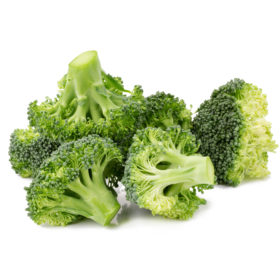
Iron
Iron is needed for healthy blood, muscles and energy levels
Everyday sources of iron:
Chickpeas, lentils, kidney beans and other pulses
Tofu
Sprouted beans and seeds
Breakfast cereals
Bread
Kale, cabbage and broccoli
Nuts
Dried fruitsHow much iron do I need?
Women (age 19 to 50): 14.8mg per day Men (age 19 to 50): 8.7mg per day Men and women (age 50+): 8.7mg per day
Hints and tips
Vitamin C helps the body to take in iron. Drinking orange juice, alongside an iron-rich meal, can help you increase its benefits.
-
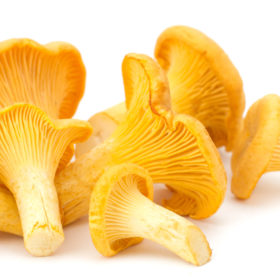
Vitamin D
Vitamin D helps the body take in calcium. It helps bones and teeth stay strong, and muscles working properly
Everyday sources of vitamin D:
Egg yolk
Cereals
Soya milk
Mushrooms e.g. wild and light-cultivated mushrooms
Fat spreads
SupplementsHow much vitamin D do I need?
Infants (less than 1 year): 8.5 to 10 μg per day Children (age 1 to 3): 10 μg per day People (age 4+): 10 μg per day [μg = micrograms]
The recommended dose for adults including pregnant and breastfeeding women is 10 micrograms.
Hints and tips
Vitamin D comes from sunlight and some foods. It is difficult to get enough vitamin D from a balanced diet. In the UK, it is recommended everyone consider taking a vitamin D supplement especially from October to late March. However, people whose skin has little or no exposure to the sun need to take a supplement throughout the year. Some vitamin D in foods and supplements is from non-vegetarian sources, so check the label. -

Vitamin B12
Vitamin B12 is needed for healthy nerves, red blood cells and building DNA
Everyday sources of vitamin B12:
Milk
Cheese
Yogurt
Eggs
Yeast extracts with added B12
Breakfast cereals with added B12 (e.g. cornflakes)
Soya milk with added B12How much vitamin B12 do I need?
Women: 1.5 μg per day Men: 1.5 μg per day [μg = micrograms]
Hints and tips
Dairy can be a main vegetarian source of vitamin B12. If using dairy-alternatives look for ones with added vitamin B12. Some health food products, such as seaweed and spirulina, stop the body taking in vitamin B12 effectively. Supplements can be an easy way to make sure you have enough vitamin B12. -
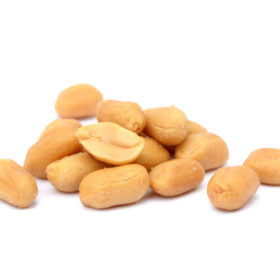
Iodine
Iodine is needed for thyroid hormones to work properly. Thyroid hormones affect the speed you burn calories and grow, and help heart and digestive functions and muscle control
Everyday sources of iodine:
Cheese
Yogurt
Seaweed
Eggs
Milk
Peanuts
Sea saltHow much iodine do I need?
Women: 140 μg per day Men: 140 μg per day [μg = micrograms]
Note: At the very early stages of pregnancy, often before it is confirmed, women have an increased iodine need.
Hints and tips
There is a lower level of iodine in organic milk. Kelp (a type of seaweed) supplements are not recommended, particularly when pregnant, because levels of iodine can be too high. Seaweed is safe to eat because levels of iodine become lower through production.
-
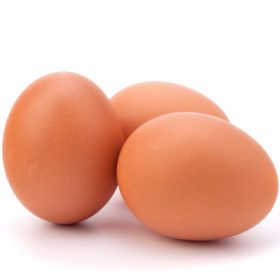
Zinc
Zinc is needed for cell growth. It supports the immune system and aids the healing of wounds
Everyday sources of zinc:
Eggs
Breakfast cereals
Cow's milk
Houmous
Nuts and seeds
Peas
Beans
Chickpeas
Bread
Cheese
PotatoesHow much zinc do I need?
Women: 7mg per day Men: 9.5mg per day
Hints and tips
It is easier for the body to take in zinc from peas, beans, lentils, and seeds that have been sprouted. These can be found in most supermarkets and wholefood shops. -
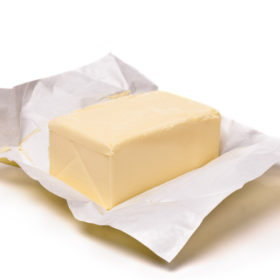
Fats
Fat is an important source of energy. It protects the body against heat loss, helps to take in vitamins A, D and E, and is an important part of the brain
Everyday sources of fats:
Saturated fats
Pies
Pastries
Butter and margarine
Cheese
Palm oil, coconut oil and coconut creamUnsaturated fats including polyunsaturated oils:
Sunflower oil
Soya oil
Flaxseed oils
Linseeds
Walnuts
Soya beansMonounsaturated oils:
Olive oil
Rapeseed oil
Avocados
Almonds
Brazil nuts
PeanutsHow much fat do I need?
Saturated fat adult daily intake (upper limit):
Women (age 19 to 64): 24g per day Women (age 65 to 74): 23g per day Women (75+): 23g per day Men (age 19 to 64): 31g per day Men (age 65 to 74): 29g per day Men (75+): 28g per day
Monounsaturated fat adult daily intake (upper limit):
Women (age 19 to 64): 29g per day Women (age 65 to 74): 28g per day Women (75+): 27g per day Men (age 19 to 64): 36g per day Men (age 65 to 74): 34g per day Men (75+): 33g per day
Hints and tips
It is important to have some healthy polyunsaturated and monounsaturated fats in the diet, and avoid unhealthy saturated fats where possible. Saturated fat increases the harmful type of cholesterol called LDL. -
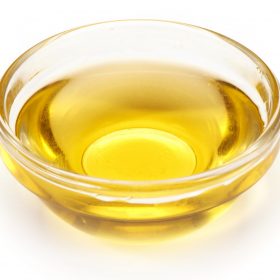
Omegas
Omega 3 and omega 6 fats are important for brain, eye and immunity. As omegas cannot be made by the body they are referred to as ‘essential fats’ and must be included in small amounts in the diet
Everyday sources of omega 3 and 6:
Omega 3
Flaxseeds (ground and oil)
Rapeseed/canola oil
Hempseed oil
Soya bean oil
Walnut oil
Algal oilOmega 6
Corn oil
Grapeseed oil
Sunflower oil
Soya bean oil
Walnut oil
Wheatgerm oil
Walnuts
Soya beansHow much omega 3 and 6 do I need?
Omega 3 recommended adult daily intake (EPA plus DHA):
Women: 250mg per day Men: 250mg per day
Omega 6 recommended adult daily intake:
Women: 10g per day Men: 10g per day
Hints and tips
Omega 3 and 6 are very important polyunsaturated fats for our diet. Too much omega 6 stops omega 3 being used. It is important to stick to a ratio of 5:1 or lower. Dietary advice is to consume long-chain omega 3 as part of a healthy diet. As vegetarians do not each fish, algal oil is a long-chain omega 3 source.

